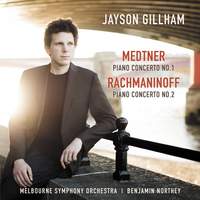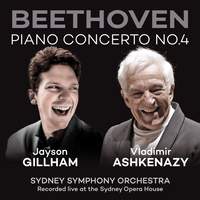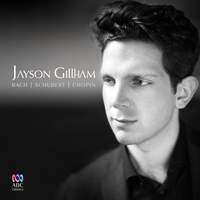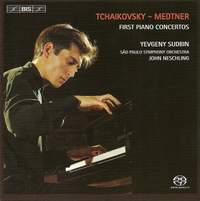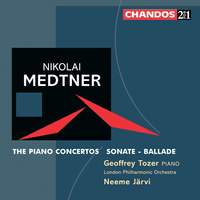Interview,
Jayson Gillham on Medtner and Rachmaninov
 This month sees the release of three fine new recordings of Rachmaninov's evergreen Second Piano Concerto - first in line is the young London-based Australian pianist Jayson Gillham, who pairs the work with a highly persuasive account of Medtner's far less well-known First Piano Concerto (written during the First World War, and dedicated to the composer's mother).
This month sees the release of three fine new recordings of Rachmaninov's evergreen Second Piano Concerto - first in line is the young London-based Australian pianist Jayson Gillham, who pairs the work with a highly persuasive account of Medtner's far less well-known First Piano Concerto (written during the First World War, and dedicated to the composer's mother).
I caught up with Jayson earlier this week to find out about how he became such a passionate advocate of Medtner's music, the parallels and contrasts between the two concertos on his new album, and Medtner's own legacy on disc as a pianist…
Your new album pairs one of the best-known Russian piano concertos with another that’s decidedly less familiar… Do you see any kinship between the two works, or is it more a relationship of contrasts?
There are indeed many contrasts between the two composers. Perhaps we hear the contrasts more because we are expecting Medtner to sound like Rachmaninov. However they do share many traits – they are both pianist-composers, both conservative in their harmony for their time, yet with a unique and recognisable harmonic language. Both concertos are richly scored with that dark Russian sound and soul. Both are in C minor!
But the contrasts are immediately evident. Medtner has more of a Germanic influence, which makes sense given his family lineage and significant exposure to and love of German music and literature. Medtner’s music has a motivic, rhythmic and contrapuntal construction, whereas Rachmaninov’s design is governed more by the melody and is more fluid. To play I would say it feels a bit like the difference between Schumann and Chopin - at least for me, how it sits under the hand. Obviously Rachmaninov had much larger hands than Chopin, but they both have an arpeggiated, open, kind of liquid feel to their writing, whereas Medtner is more chordal and feels more 'chunky' like Schumann. Medtner also has some of the obsessive rhythmic tendencies of Schumann.
Do you have any theories on why Medtner’s concertos have never gained a foothold in the repertoire in the same way as Rachmaninov’s?
It’s generally accepted (and I would agree) that Medtner’s music improves on repeated listening – but then a lot of standard and oft-played music is like that. I think it just needs to be played more, and as people hear it more they will grow to like it, appreciate it and hopefully love it!
Another issue we found when preparing the piece was that this particular concerto has never been published properly, in that the orchestra had to use hand-written parts! I feel that if this piece were to be given a new modern edition with printed parts it would be programmed more. It’s a task I might consider tackling myself as I’d love to tour with this concerto.
When and how did you first come across this concerto, and what attracted you to it?
I was asked to be involved in a documentary about the Australian pianist Geoffrey Tozer, who, as well as being one of the greatest pianists Australia has ever produced, was a great lover and advocate of Medtner's music. The piece I would learn during the process of the documentary was the Medtner First Piano Concerto - and this is how I became exposed to this music. I was immediately gripped by the startling opening of this work, and captivated by the uniqueness of the harmonic and rhythmic complexity.
You've supplemented each concerto with a short piano piece by the same composer – what are the connections between these two miniatures and the ‘main’ works?
I must admit I was thinking more of the emotional contour of the album, where these two works provide some much-needed solace (in the case of the Medtner Angel) and relaxation (the Rachmaninov Prelude) after the concertos. However the Rachmaninov Preludes Op. 23 were written at a similar time to the Second Concerto, a happy period where he was newly married and his wife was expecting their first child.
Medtner’s Angel is a very special piece that was written when he was only 17. It is his Op. 1 No. 1 and the maturity and perfection of this piece is incredible. It is based on a poem which describes a young soul brought down to earth by an Angel, on the wings of a heavenly song, and the earthly soul spending the rest of its life trying to recapture the perfect beauty of this fundamental divine song. It is a metaphor for Medtner’s life as a composer.
Much ink has been spilled over the years on the subject of Rachmaninov’s own recordings of his concertos (and his rather ambivalent relationship with them) – how much do we know about Medtner’s attitude towards HIS own recordings, and how much did they influence your interpretation?
Medtner recorded his Concertos and many other works near the end of his life as a project funded by the Maharaja of Mysore, who adored Medtner’s music and wanted to ensure a recorded legacy of the composer playing his own work. Incidentally the Maharaja gave copies of Medtner’s recordings to Geoffrey Tozer’s mother (Geoffrey was born in India) and this is how Geoffrey first came to love the music of Medtner. And I have come to Medtner through Geoffrey.
At the time of these recordings Medtner was not at his peak in terms of health and playing – he had suffered a heart attack and was no longer performing in public. He could record, however, and I think he was pleased with the recordings in general. For me however, the First Concerto is somewhat lacking in drama and virtuosity, but this is only understandable given the circumstances. I learnt a lot from his recording and it is a wonderful resource for us to have, but I feel that there is more of Medtner’s intentions to be found in the score itself. Other more recent recordings that did influence me include those of Geoffrey Tozer, Igor Zhukov and Yevgeny Sudbin.
Medtner & Rachmaninov: Piano Concertos
Jayson Gillham (piano), Melbourne Symphony Orchestra, Benjamin Northey
Jayson Gillham's recording of Medtner and Rachmaninov concertos was released on Linn on 25th August.
Available Formats: MP3, FLAC, Hi-Res FLAC
Jayson Gillham (piano), Sydney Symphony Orchestra, Vladimir Ashkenazy
Available Formats: MP3, FLAC, Hi-Res FLAC
Jayson Gillham (piano), Sydney Symphony Orchestra, Vladimir Ashkenazy
Available Formats: CD, MP3, FLAC, Hi-Res FLAC
Recordings referenced in this interview
Yevgeny Sudbin (piano), São Paulo Symphony Orchestra, John Neschling
Available Formats: SACD, MP3, FLAC, Hi-Res FLAC
Geoffrey Tozer (piano), London Philharmonic Orchestra, Neeme Järvi
Available Formats: 2 CDs, MP3, FLAC, Hi-Res FLAC


